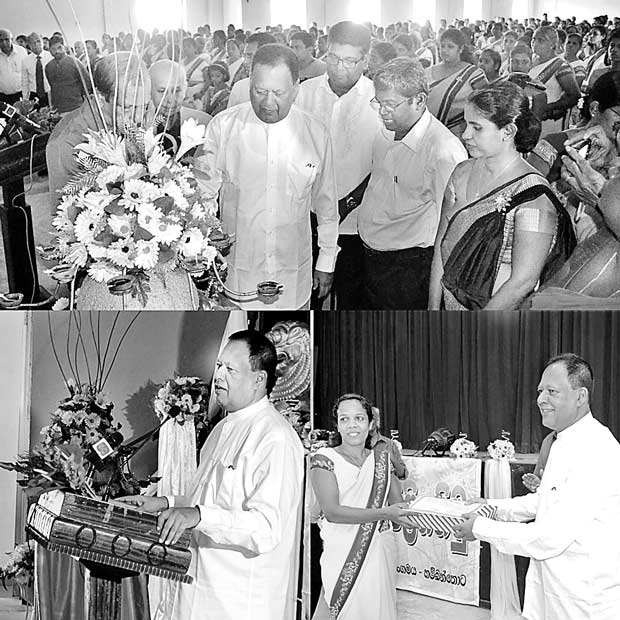Reply To:
Name - Reply Comment

“In order to develop the village the rural population must be provided with land, capital and technical training” said the Minister for Special Assignments Dr Sarath Amunugama addressing the 26th Annual Session of the Women’s Development Federation ( Kantha Sanwardhana Maha Sangamaya), recently.
Special Assignments Minister Dr Sarath Amunugama participated at the 26th Annual Sessions of the Women’s Development Federation ( Kantha Sanwardhana Maha Sangamaya) as Chief Guest, representing the President. This event took place on 29th December at the Singapore Community Centre, Hambantota . About 5000 representatives of rural women volunteers of the Hambantota and Moneragala districts took part in this event.
At these sessions the members of the organization displayed their skills and talents while the minister made presentations of prizes, certificates and other awards to the volunteers for motivating them further. This women’s development association is engaged in the economic and social empowerment of 72000 poor families in the Hambantota and Moneragala districts.
The picture above shows Dr Amunugama participating at these sessions. A large gathering including Prof Carlo Fonseka and former Government Agent Mithrapala who was the initiator of this movement, took part in this event.
Speaking further the Minister said:
“Three things are essential for the development of the village. Firstly the rural people must be given land. Secondly they must be provided with the necessary capital. The third thing is technical training. Without these you cannot develop the village.
The land laws must be amended to make it possible for land to be provided easily to people who genuinely engage themselves in some industry or a trade benefitting the country. Such people should be given land free. We cannot develop a country without doing so. Our special attention should be directed at not the large scale investors but the small and medium investors. The traditional lending programme of the state banks in Sri Lanka have failed.
It is the Sri Lankan woman who has contributed most to the economy. It is women who contribute to the three principal sources of income of the country. It is the women who are employed in the Middle East, the women who are engaged in the garment industry and the women who are employed in the tea industry who bring in the biggest income to the country. We must now start a venture to make women the providers of the fourth biggest source of income also. In all likelihood women’s volunteer services like this can be made partners in such a venture.
Whatever economic analysis we may engage ourselves in, whatever strategies we may adopt, unless we succeed in raising the level of income of the rural family, no government will survive for long. That is the reality. Today many people are searching for solutions to this problem. Those solutions must be practical. In 1947 and 1948 the population of Sri Lanka was 60 lakhs, today it has risen to 210. In our own lifetime the population has increased fourfold.
The welfare programmes initiated by the state are now facing a problem due to the increase in population. We will not curtail the welfare measures whatever problem we may have to face. In order to provide for welfare we must increase the national income. The population increases but the resources are limited. In order to overcome this contradiction we must strengthen the rural economy of our country. It is the government’s endeavour to develop the country, including the rural economy and thereby provide the people with a better standard of living, enhancing their incomes, while refraining from curtailing the present welfare measures.